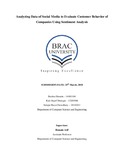| dc.contributor.advisor | Arif, Hossain | |
| dc.contributor.author | Shourin, Bushra | |
| dc.contributor.author | Shawgat, Kazi Sayef | |
| dc.contributor.author | Chowdhury, Serajur Reza | |
| dc.date.accessioned | 2018-05-10T10:59:02Z | |
| dc.date.available | 2018-05-10T10:59:02Z | |
| dc.date.copyright | 2018 | |
| dc.date.issued | 2018-04 | |
| dc.identifier.other | ID 14101104 | |
| dc.identifier.other | ID 13201046 | |
| dc.identifier.other | ID 18141011 | |
| dc.identifier.uri | http://hdl.handle.net/10361/10124 | |
| dc.description | This thesis is submitted in partial fulfilment of the requirements for the degree of Bachelor of Science in Computer Science and Engineering, 2018. | en_US |
| dc.description | Cataloged from PDF version of thesis. | |
| dc.description | Includes bibliographical references (pages 24-26). | |
| dc.description.abstract | In this modern age where providing and consuming services through online exchange has become a daily chore, everyone loves to participate and give opinions about the services he or she consumes. Nowadays this participation is taking place much more on social sites rather than in a complain box. Facebook is one of the most commonly used social media sites where people voice their opinions on just about everything. So many service providers take the platform to promote their services among the customers. Tele-communication sector is one of them. It is quite apparent that many Tele-communication company maintains a Facebook page or group to promote their services to the customers and get feedback from them. A large number of data is being produced in this way daily.
Telephone companies collect data of customers and often provide special offers to all or particular customers. Customers give their view about those offers on social networking sites. With the help of their opinions the offers become more realistic, attractive and in the meantime profitable. But the amount of data being produced daily is massive and growing. So it is fairly hard or improbable to go through all the data and come to a decision. It needs a special kind of procedure which has to be dynamic and efficient based on time and expense.
In this thesis, We will extract all the opinions (comments as text data) from the respective Facebook pages using the Facebook graph API provided by Facebook application and go through noise cleaning, applying algorithm and classifier to calculate the sentiment polarity to come to a decision whether the offers provided by the company are getting good feedback or being criticized. We will use Naïve Bayes classifier for our sentiment analysis. | en_US |
| dc.description.statementofresponsibility | Bushra Shourin | |
| dc.description.statementofresponsibility | Kazi Sayef Shawgat | |
| dc.description.statementofresponsibility | Serajur Reza Chowdhury | |
| dc.format.extent | 26 pages | |
| dc.language.iso | en | en_US |
| dc.publisher | BRAC University | en_US |
| dc.rights | BRAC University theses are protected by copyright. They may be viewed from this source for any purpose, but reproduction or distribution in any format is prohibited without written permission. | |
| dc.subject | Opinion | en_US |
| dc.subject | Sentiment analysis | en_US |
| dc.subject | Facebook | en_US |
| dc.subject | Facebook graph | en_US |
| dc.subject | API | en_US |
| dc.subject | Naïve bayes classifier | en_US |
| dc.title | Analyzing data of social media to evaluate customer behavior of companies using sentiment analysis | en_US |
| dc.type | Thesis | en_US |
| dc.contributor.department | Department of Computer Science and Engineering, BRAC University | |
| dc.description.degree | B. Computer Science and Engineering | |

